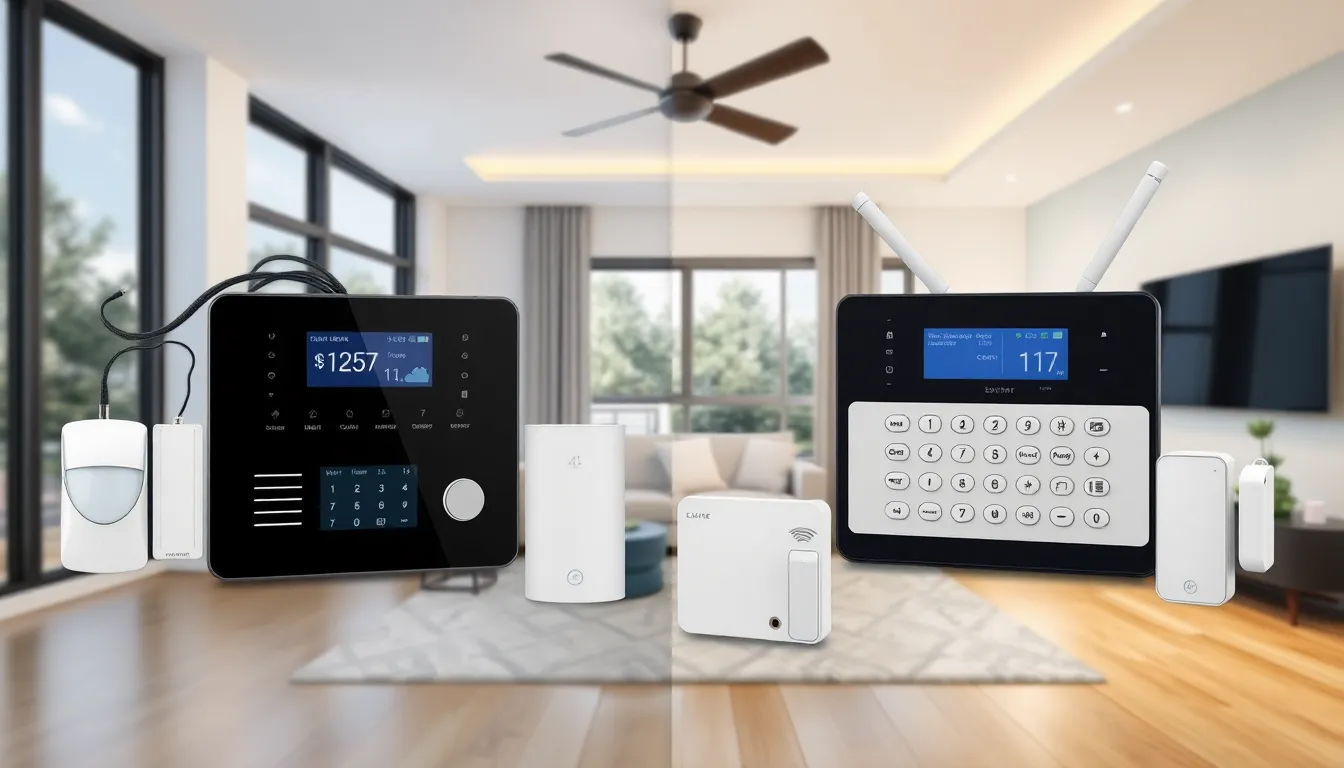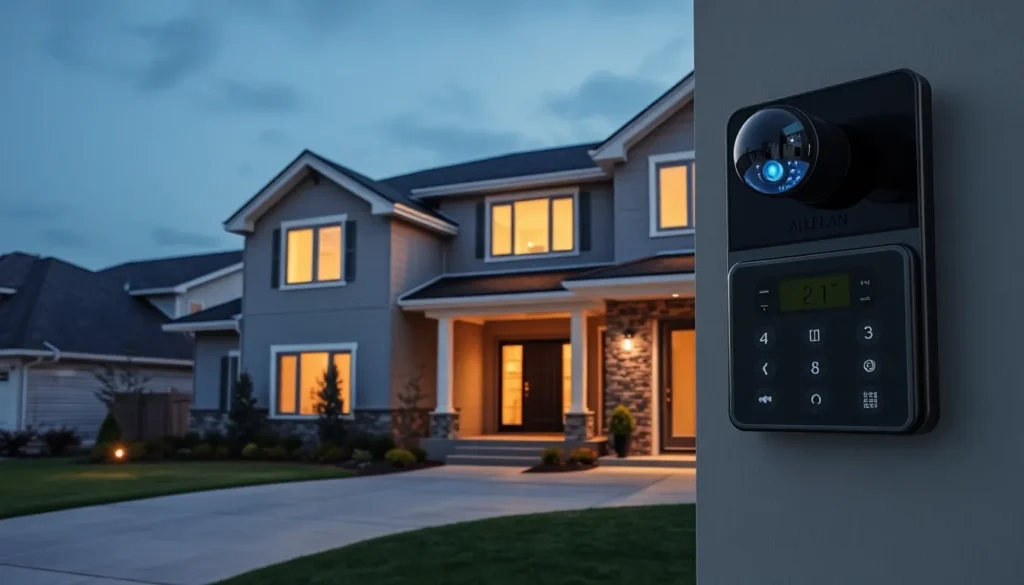Table of Contents
ToggleHome security is a top priority for many homeowners, and alarm systems play a crucial role in safeguarding properties. With the rise in crime rates and increasing concerns about safety, investing in a reliable alarm system has never been more important. These systems not only deter intruders but also provide peace of mind, knowing that one’s home is protected.
Modern alarm systems come equipped with advanced technology, offering features like remote monitoring, motion detection, and smart home integration. As homeowners seek effective solutions to enhance their security, understanding the various options available can make all the difference. From traditional wired systems to cutting-edge wireless setups, the right alarm system can significantly reduce the risk of break-ins and ensure a safe living environment.
Overview of Alarm Systems for Home
Alarm systems for home provide essential protection against intrusions and emergencies. These systems generally comprise control panels, sensors, cameras, and alarms that work together to monitor properties.
Types of Alarm Systems
- Wired Systems: Wired alarm systems connect directly to the home’s electrical system. They offer reliable performance but may require professional installation.
- Wireless Systems: Wireless alarm systems use radio signals to communicate. These systems provide flexibility in placement and are easier to install without extensive renovations.
- Monitored Systems: Monitored alarm systems connect to professional monitoring centers. These centers alert authorities during a break-in or emergency, enhancing response times.
- Unmonitored Systems: Unmonitored systems rely on loud alarms to alert homeowners and neighbors. They offer a cost-effective solution but lack professional security support.
Key Components
- Control Panel: The control panel serves as the system’s command center, allowing users to arm or disarm the system.
- Sensors: Motion sensors detect movement within the protected area, while door/window sensors alert when openings occur.
- Cameras: Surveillance cameras provide video monitoring and allow homeowners to view live feeds remotely.
- Alarms: Loud alarms trigger during unauthorized access or emergencies, deterring intruders and alerting nearby individuals.
Additional Features
- Remote Monitoring: Homeowners can monitor their properties via smartphones or tablets, receiving real-time alerts and viewing live camera footage.
- Smart Home Integration: Many modern systems integrate with smart home devices, allowing for automation and enhanced control over security settings.
- Environmental Sensors: Some systems include sensors for smoke, carbon monoxide, and flooding, providing comprehensive protection against various hazards.
- Emergency Alerts: Alarm systems can send alerts to emergency contacts during crises, ensuring a quicker response.
Homeowners benefit from choosing the right alarm system by increasing both security and peace of mind. The variety of options allows customization based on specific needs and budget considerations.
Types of Alarm Systems

Several types of alarm systems cater to different security needs. Understanding these types helps homeowners choose the best protection solution for their properties.
Wired Alarm Systems
Wired alarm systems utilize physical cables to connect components directly to a control panel. These systems often offer greater reliability and stability, as they are less susceptible to interference. Installation typically requires professional assistance due to the need for extensive wiring throughout the home. However, wired systems generally provide lower monthly maintenance costs compared to wireless alternatives. Some key features include:
- Durability: Wired systems withstand external factors better than wireless setups.
- Dependability: Cables secure the connection, reducing the risk of signal loss.
- Cost-effectiveness: Long-term operational savings occur due to lower maintenance expenses.
Wireless Alarm Systems
Wireless alarm systems operate through radio signals or Wi-Fi, eliminating the need for extensive wiring. They offer quick and straightforward installation, accommodating both DIY and professional setups. Wireless systems appeal to renters and homeowners seeking flexibility, as they can easily be relocated. Common aspects include:
- Ease of installation: No extensive wiring means quicker setup and relocation.
- Versatility: Wireless systems support additional sensors and cameras, expanding coverage.
- Smart technology integration: Many wireless systems connect seamlessly with smartphones and smart home devices.
Monitored vs. Unmonitored Systems
Monitored and unmonitored systems differ primarily in the level of oversight.
- Monitored systems provide real-time monitoring through third-party services, ensuring immediate alerts to authorities during emergencies. These systems typically require a monthly subscription but deliver enhanced security.
- Unmonitored systems rely on the homeowner to respond to alarms. While these systems incur no monthly fees, they lack the immediate support of professional monitoring.
Choosing between monitored and unmonitored systems depends on individual preferences and budgets. Each option offers distinct advantages and can effectively enhance home security when tailored to specific needs.
Key Features to Look For
Selecting the right alarm system significantly impacts home security. Understanding key features ensures that homeowners choose an effective system tailored to their needs.
Sensors and Detectors
Sensors and detectors play a crucial role in an alarm system’s effectiveness. Motion sensors detect movement in and around the home, alerting residents to any unusual activity. Contact sensors attach to doors and windows, sending notifications when they open. Glass break sensors alert homeowners if they detect the sound of breaking glass. Ensure the system covers all vulnerable entry points for maximum protection.
Mobile App Integration
Mobile app integration enhances accessibility and control for homeowners. These apps enable users to monitor their home security remotely from smartphones or tablets. Through the app, users receive real-time alerts and can manage system settings, including arming and disarming the system. Some systems offer video feeds, allowing homeowners to view live footage from security cameras, ensuring comprehensive monitoring.
Environmental Monitoring
Environmental monitoring adds an extra layer of protection to home security systems. Smoke detectors notify users of potential fire hazards, while carbon monoxide detectors alert individuals to dangerous gas levels. Flood sensors can detect leaks or rising water levels, preventing costly damage. Integrating environmental monitoring ensures a holistic approach to safety, protecting against various threats.
Benefits of Installing Alarm Systems for Home
Alarm systems offer several advantages that enhance safety and overall protection for homes. Understanding these benefits helps homeowners make informed decisions about their security needs.
Enhanced Security
Enhanced security provides a strong deterrent against potential intruders. Various components like cameras, motion detectors, and alarms work together to create a robust defense system. Integration with smart home technology allows for real-time alerts and monitoring, ensuring response times improve significantly when threats arise. Studies indicate homes with alarm systems are up to 300% less likely to be targeted by burglars.
Peace of Mind
Peace of mind is crucial for any homeowner, and a reliable alarm system contributes significantly to this sense of security. Homeowners can rest easier knowing their property is monitored around the clock. Features like mobile app control enable individuals to check their systems remotely, providing reassurance when away from home. The mere presence of an alarm system fosters confidence, allowing families to enjoy their space without constant worry about potential break-ins.
Insurance Discounts
Insurance discounts can provide financial benefits to homeowners investing in alarm systems. Many insurance providers offer up to 20% off premiums for homes equipped with monitored security systems. This discount reflects the lower risk of theft or damage, translating to savings over time. Homeowners should consult with their insurance agents to explore these potential savings opportunities, making an alarm system a cost-effective security solution in addition to its protective capabilities.
Investing in a home alarm system is a crucial step towards ensuring safety and peace of mind. With advancements in technology and a wide range of options available, homeowners can find a system that fits their unique needs. Whether opting for a wired or wireless setup, the right alarm system not only deters potential intruders but also enhances overall security.
Incorporating features like remote monitoring and environmental sensors creates a comprehensive safety net. The benefits extend beyond just protection; homeowners can also enjoy potential savings on insurance premiums. By choosing a reliable alarm system, individuals can rest easy knowing their homes are well-protected against various threats.





